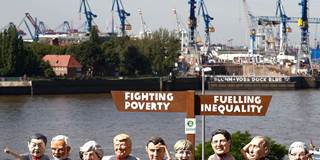Building support for a new unifying economic paradigm to replace the discredited Washington Consensus will be an analytically challenging, politically demanding, and time-consuming process. In the meantime, both economists and policymakers must ensure that the existing paradigm doesn't cause more damage than it already has.
LAGUNA BEACH – For decades, the Western world put its faith in a well-defined and broadly accepted economic paradigm with applications at both the national and global levels. But, against a background of declining confidence in the ability of “experts” to explain, let alone predict, economic developments, that faith has deteriorated. With a new paradigm having yet to emerge, the world economy faces a heightened risk of fragmentation, with already-vulnerable countries being left even further behind.
The paradigm that, until recently, dominated much of economic thinking and policymaking is embodied in the so-called Washington Consensus – a set of ten broadly applicable policy prescriptions for individual countries – and, at the international level, in the pursuit of economic and financial globalization. The idea, simply put, was that countries would benefit from embracing market-based pricing and deregulation at home, while fostering free trade and relatively open cross-border capital flows.
Deepening the economic and financial linkages among countries was viewed as the best way to deliver durable gains, enhance efficiency and productivity, and mitigate the threat of financial instability. This approach was also deemed to yield collateral benefits, from enhancing internal social mobility to reducing the risk of violent conflict among countries. And it promised to support the positive convergence of developing and developed countries, thereby reducing both absolute and relative poverty and weakening economic incentives for illegal cross-border migration.

LAGUNA BEACH – For decades, the Western world put its faith in a well-defined and broadly accepted economic paradigm with applications at both the national and global levels. But, against a background of declining confidence in the ability of “experts” to explain, let alone predict, economic developments, that faith has deteriorated. With a new paradigm having yet to emerge, the world economy faces a heightened risk of fragmentation, with already-vulnerable countries being left even further behind.
The paradigm that, until recently, dominated much of economic thinking and policymaking is embodied in the so-called Washington Consensus – a set of ten broadly applicable policy prescriptions for individual countries – and, at the international level, in the pursuit of economic and financial globalization. The idea, simply put, was that countries would benefit from embracing market-based pricing and deregulation at home, while fostering free trade and relatively open cross-border capital flows.
Deepening the economic and financial linkages among countries was viewed as the best way to deliver durable gains, enhance efficiency and productivity, and mitigate the threat of financial instability. This approach was also deemed to yield collateral benefits, from enhancing internal social mobility to reducing the risk of violent conflict among countries. And it promised to support the positive convergence of developing and developed countries, thereby reducing both absolute and relative poverty and weakening economic incentives for illegal cross-border migration.